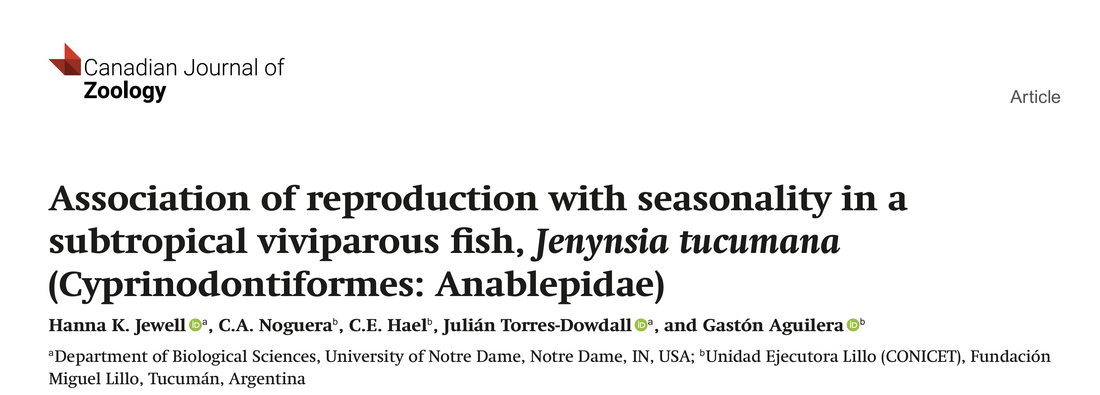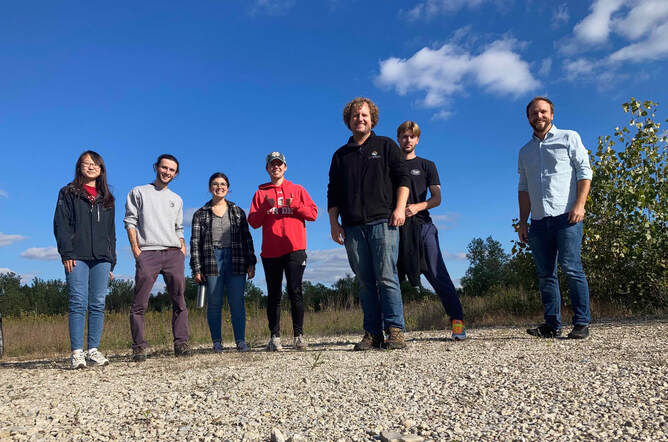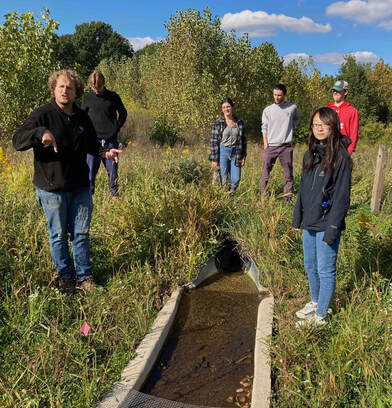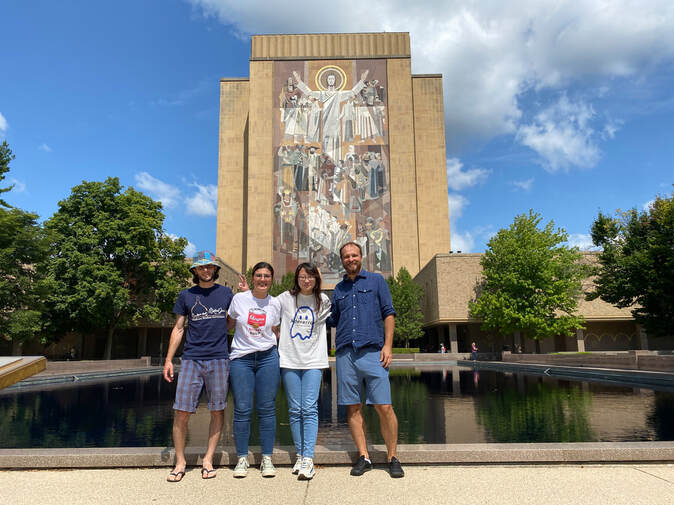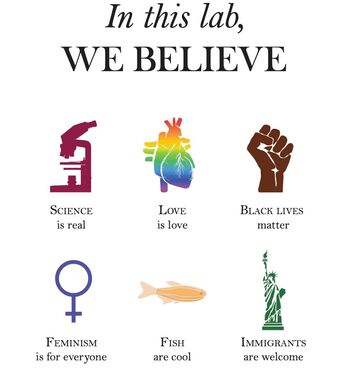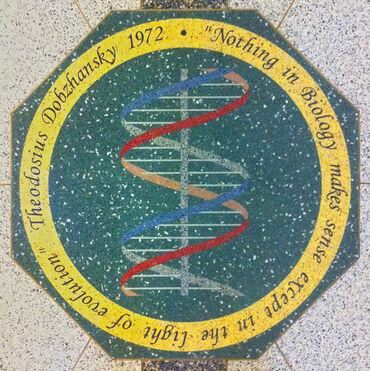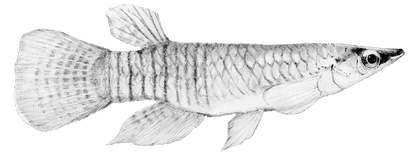
Welcome to the Torres-Dowdall lab at Notre Dame
Our research group investigates the causes and consequences of adaptive evolution. We study patterns of phenotypic variation along ecological gradients to understand how genetic and developmental variation interact with the environment to generate diversity. We use a combination of field, laboratory, and statistical approaches to identify the genetic, molecular, and environmental drivers of variation in traits such as morphology, visual sensitivity, and life history.
Our research group investigates the causes and consequences of adaptive evolution. We study patterns of phenotypic variation along ecological gradients to understand how genetic and developmental variation interact with the environment to generate diversity. We use a combination of field, laboratory, and statistical approaches to identify the genetic, molecular, and environmental drivers of variation in traits such as morphology, visual sensitivity, and life history.
Lab News

January 2024
Congratulations to César, whose paper was just published online in AmNat! In this paper, César looks at the environmental and genetic contributions to phenotypic variation in the visual system of Midas cichlids along a gradient of ambient light conditions.
Congratulations to César, whose paper was just published online in AmNat! In this paper, César looks at the environmental and genetic contributions to phenotypic variation in the visual system of Midas cichlids along a gradient of ambient light conditions.

October 2023
Xiyuan has published a series of educational books on the natural group. Congratulations to her and her co-workers!
Xiyuan has published a series of educational books on the natural group. Congratulations to her and her co-workers!
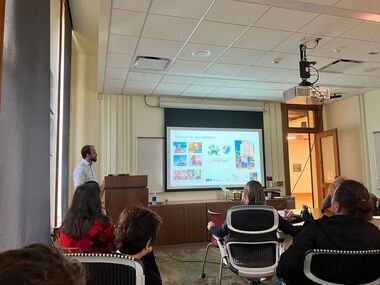
October 2023
Julián presented some of our research at University of Illinois Urbana-Champaign. It was a great visit to a fantastic department. Also it was great to discuss collaborations with Becky Fuller and to get reunited with the amazing Eva Fisher!
Julián presented some of our research at University of Illinois Urbana-Champaign. It was a great visit to a fantastic department. Also it was great to discuss collaborations with Becky Fuller and to get reunited with the amazing Eva Fisher!
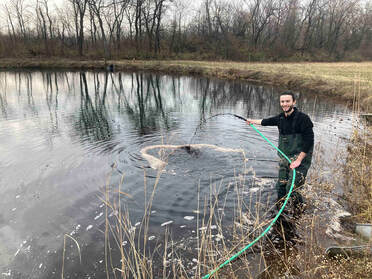
November 2022
César is starting his light environment manipulations
By adding organic humic acid to large ponds, César is aiming to determine the genetic and environmental components of phenotypic variation in the visual system of sunfishes. His experiment will allow us to determine if phenotypic variation across populations is associated with performance in different photic environments. His experiment is conducted in the experimental ponds at ND-LEEF, one of the fantastic facilities at Notre Dame.
César is starting his light environment manipulations
By adding organic humic acid to large ponds, César is aiming to determine the genetic and environmental components of phenotypic variation in the visual system of sunfishes. His experiment will allow us to determine if phenotypic variation across populations is associated with performance in different photic environments. His experiment is conducted in the experimental ponds at ND-LEEF, one of the fantastic facilities at Notre Dame.
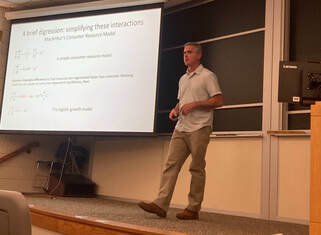
October 2022
Thank you Ron Bassar for the visit and the great seminar!
Ron visited University of Notre Dame and gave a seminar at the Department of Biological Sciences. He talked about their ongoing Guppy project, where Ron and collaborators introduced high predation guppies into upstream, low predation sites. They have monitored them for over 10 years to understand how life histories evolve. Their research have strongly contributed to the understanding how eco-evolutionary feedbacks influence the evolution.
Thank you Ron Bassar for the visit and the great seminar!
Ron visited University of Notre Dame and gave a seminar at the Department of Biological Sciences. He talked about their ongoing Guppy project, where Ron and collaborators introduced high predation guppies into upstream, low predation sites. They have monitored them for over 10 years to understand how life histories evolve. Their research have strongly contributed to the understanding how eco-evolutionary feedbacks influence the evolution.
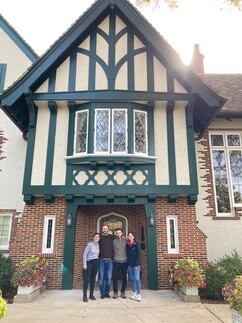
October 2022
- The lab visited Sarah Fitzpatrick at the Kellogg Biological Station.
- The whole lab went to Michigan to listen to a seminar by Sarah Fitzpatrick on genetic rescue on small, endangered populations. Sarah's talk was fantastic and the Kellogg Biological Station is such a great place to visit. Researchers at KBS made and are making a lot of key contributions in ecology and evolution.
|
September 2022
|
- We are here! We all arrived to Notre Dame and we had our first lab meeting ever!
- Proud to announce that César will be starting his first field season in May, supported by an UNDERC Graduate Fellowship!
- Congratulations to César who was granted a Merrilee Clark Redmond Endowment for Excellence - Graduate Research Initiation Grant!
- We are excited to announce that Hanna Jewell is joining the lab in August 2022! Hanna comes from Boston College where she worked on determining the mechanisms and function of nuclear positioning of the cell on the blood-brain barrier. Welcome!
- We are glad to announce that Xiyuan Guan has decided to join the lab starting on August 2022! Xiyuan has completed her bachelor in Biological Sciences at the University of the Chinese Academy of Sciences where she worked in the evolution of mating behavior in birds.
- We are happy to announce that César Bertinetti Cerrato is joining the lab in August 2022! César completed his Master at Konstanz University, Germany, working on the links between environment, phenotype and fitness.
Join the lab!
We are looking for motivated undergraduate students to join the lab. Our research provides opportunities to get involved in molecular and organismal level work in evolutionary ecology and possibilities to conduct lab and/or field research. We are also currently recruiting PhD students and Postdocs. If you are interested in our research, please contact Dr. Torres-Dowdall for further information.
